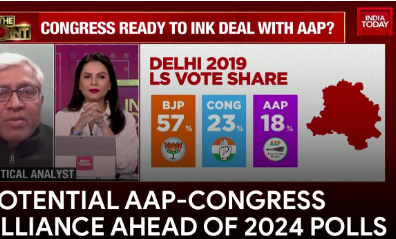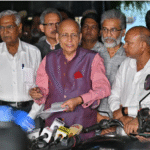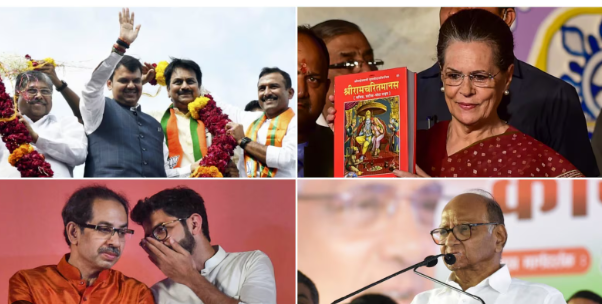BJP’s :- The political landscape in India is often marked by strategic maneuvers, coalition dynamics, and power struggles among political parties. In a recent development, a Delhi minister has alleged that the Bharatiya Janata Party (BJP) has relaunched its “Operation Lotus” to break the Aam Aadmi Party (AAP) in Delhi. This article provides a comprehensive analysis of the alleged resurgence of “Operation Lotus,” delves into its historical context, examines its potential implications for Delhi’s political scenario, and explores the broader implications for Indian democracy.
I. Understanding BJP’s “Operation Lotus”: A Political Strategy Unveiled
“Operation Lotus” is a term coined to describe a political strategy employed by the BJP to engineer defections from rival parties and destabilize their governments. The term derives its name from the lotus, the symbol of the BJP. The strategy typically involves luring legislators from opposition parties to defect and join the BJP or its allies, thereby weakening the opposition and strengthening the ruling party’s grip on power. While “Operation Lotus” has been used in various states across India, its resurgence in Delhi signals a renewed focus on expanding the BJP’s influence in the national capital. 
II. Allegations and Accusations: Claims of BJP’s Machinations
The recent allegations by a Delhi minister regarding the relaunch of “Operation Lotus” have sparked controversy and debate in political circles. The minister has accused the BJP of engaging in backroom dealings and offering inducements to AAP legislators to defect and join the BJP camp. These allegations, if proven true, could have far-reaching implications for Delhi’s political landscape and raise questions about the BJP’s commitment to ethical governance and democratic principles. However, it is essential to ascertain the veracity of these allegations and investigate any potential violations of electoral laws and ethical standards.
III. Historical Context: “Operation Lotus” and Its Legacy
The history of “Operation Lotus” dates back to the early 2000s when the BJP employed similar tactics to topple state governments led by opposition parties. The strategy gained prominence in Karnataka in 2008, where the BJP engineered defections from the Janata Dal (Secular) to form a coalition government. Subsequently, “Operation Lotus” was replicated in other states, including Goa, Manipur, and Madhya Pradesh, with varying degrees of success. The resurgence of “Operation Lotus” in Delhi reflects a continuation of this political strategy, albeit in a new context and with renewed objectives.
IV. Implications for Delhi’s Political Landscape: A Tug of War for Power
The alleged relaunch of “Operation Lotus” in Delhi has significant implications for the city’s political landscape, which has been dominated by the AAP in recent years. With the BJP aiming to expand its presence and challenge the AAP’s supremacy, the stage is set for a fierce political battle characterized by defections, horse-trading, and coalition politics. The outcome of this power struggle will not only shape the future of Delhi’s governance but also have repercussions for national politics, setting the stage for the 2024 general elections.
V. Challenges to Democracy: Ethical Concerns and Democratic Values
The resurgence of “Operation Lotus” raises broader concerns about the health of India’s democracy and the ethical conduct of political parties. While defections and coalition politics are integral to the functioning of a multi-party democracy, the use of inducements and coercion to engineer defections undermines the principles of fair play, transparency, and electoral integrity. Such tactics erode public trust in democratic institutions and contribute to the perception of politics as a realm of opportunism and self-interest rather than public service. check latest news here
VI. Response and Resilience: AAP’s Strategy Amidst Challenges
In the face of BJP’s alleged attempts to destabilize its government, the AAP faces the daunting task of defending its legislators and preserving its mandate. The party must remain vigilant against inducements and ensure the loyalty of its members through effective governance, ideological coherence, and grassroots mobilization. Additionally, the AAP must leverage public opinion and civil society support to expose any attempts at subverting democracy and rally popular sentiment in its favor.
VII. Conclusion: Safeguarding Democratic Values Amidst Political Machinations
In conclusion, the alleged relaunch of “Operation Lotus” in Delhi underscores the challenges and complexities inherent in India’s democratic polity. While political parties engage in strategic maneuvers to gain power and influence, it is imperative to uphold democratic values, ethical standards, and the rule of law. Any attempts to subvert democracy through unethical means must be condemned and addressed through legal and institutional mechanisms. Ultimately, the resilience of India’s democracy depends on the vigilance, engagement, and active participation of its citizens in safeguarding democratic values and institutions. click on link for watching video





